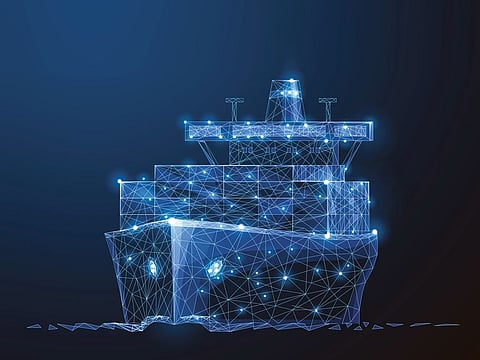Chain reaction
Blockchain is poised to revolutionise the region’s maritime sector. Here’s how

Although an estimated 90 per cent of the world’s trade relies on shipping, the sector has been notoriously conservative in adapting to new developments, but that looks set to change as ports and maritime operators embrace connected technologies such as autonomous transport to artificial intelligence and blockchain.
In December, DP World joined a group of eight terminal operators and ocean carriers to form a global digital network based on blockchain. The operator is also working on its own blockchain solution for the group, which it expects to launch later this year, Sultan Ahmed Bin Sulayem, Chairman and CEO of DP World Group, the global port operator, said in a statement to GN Focus.
“Digital technologies will impact the way we conduct trade and logistics both now and in the future,” Bin Sulayem says. “We gather as much data in 48 hours as humans have gathered over centuries and it comes in many forms — high speed, high volume, high variety. Our opportunity is to use information to produce knowledge to produce action,” he adds.
Across the industry, the World Trade Organisation estimates that digital technologies could add between 31 and 34 per cent to trade growth over the next 15 years in terms of lowered costs. Digital supply chains can reduce process costs by 50 per cent and procurement by 20 per cent, while raising revenue 10 per cent, according to the Centre for Global Enterprise. Of these, blockchain, a distributed ledger where transactions are managed and stored across a network of computers, could comprise up to 10 per cent of global GDP by 2027. “Blockchain’s main advantage is its transparency and ability to organise digital information,” Bin Sulayem says.
Useful to maritime industry
Even as the internet has made cross-border transactions easier, it has enabled shipping companies to optimise their fleet, automate processes, drive performance efficiencies and bring down costs. With the industry having committed to make onboard internet available around the clock, as it is on land, transport data can now be exchanged in real time. In particular, blockchain appreciably improves this high-risk paper-intensive environment, allowing everyone along the chain to track and trace the cargo, while preventing any single party from making changes. The results are improved security, agility and heightened responsiveness when demand surges.
“As organisations adopt blockchain, they will naturally become more efficient, thanks to real-time tracking updates and the replacement of hardcopy documents with a smaller, more
secure digital footprint that is far easier to manage,” explains Atif Rafiq, co-founder of Qafila, a digital freight-forwarding platform.
The tech advantage
The region is already home to a number of maritime blockchain initiatives. Last year, the Dubai Chamber of Commerce and Industry partnered with the Dubai Future Foundation to create the Digital Silk Road project, which aims to leverage the technology to eliminate weaknesses such as security and cost issues. Further south, Abu Dhabi Ports’ Maqta Gateway announced testing of its Silsal blockchain solution with the Port of Antwerp last year, aiming to improve cargo visibility and trade flows between the UAE and Belgium.
“As technology advances, organisations reach turning points that test the foundations of their operational models and commercial viability,” says Mark Geilenkirchen, CEO, Sohar Port and Freezone, where he and his team are looking at how blockchain technologies could improve logistics management. “This will include research into digitisation platforms that are designed for use by shipping industries and finding one that meets our particular requirements and will potentially improve efficiency and productivity at both the port and freezone,” he adds.
“Together with the internet of things (IOT), connected fleets require a higher level of security and blockchain is an incomparable solution. It has improved tracking and enhanced traceability, thus making maritime transport more reliable and secure.”
It’s early days for the technology, however, and more remains to be done in terms of adoption — not least, says Bin Sulayem, from a human perspective. He calls for a mindset change. “In this age of the mind it is solutions that count and the ability to be smarter, more agile while acting on knowledge gained through these technologies that will essentially bestow leadership and seperate followers from leaders. ” ■



